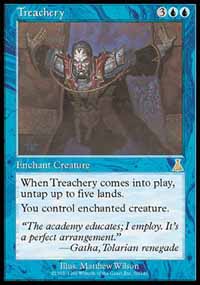|
Efficiency
in Inefficiency: Part 1, The Random Element.

Before I begin, I will admit that these articles and what I state here will
contradict much of what I have said before.
The goal of this series is not to prove something to anyone but perhaps
myself. I will, however, take you
along for the ride. How long will
this series last? I don't know.
What will the end result be? I
haven't a clue. What are they about? That,
I do know. But to begin, let me
give a little bit of background information first.
For a long
time one fact (and person) in particular has perplexed me.
His name is Chris Shumard and is known for playing rather random decks.
I shall provide you with a picture of him.

I don't
mean random as in an unpopular deck at the time, but Chris plays nearly complete
original creations and more often than not performs above average.
However, to me at least, this makes little sense.
If he is not playing with decks that are already out there, then he is
playing with something that would have to be seen as suboptimal. For example, take this creation from a PTQ Mr. Shumard played
in over Christmas break.
9 Island
2 Forest
2 Dust Bowl
2 Faerie Conclave
1 Windswept Heath
3 Flooded Strand
4 Yavimaya Coast
23 lands
4 Counterspell
4 Mana Leak
4 Force Spike
2 Rewind
1 Forbid
15 countering spells
2 Treachery
1 Capsize
4 Brainstorm
3 Naturalize
3 Powder Keg
3 Fact or Fiction
2 Cunning Wish
18 other spells
1 Morphling
2 Krosan Tusker
1 Blurred Mongoose
4 creatures
Several of the card choices stick out as strange, but he was only one round
short of making Top 8. Looking at
the decklist overall, most of the
cards are very efficient. The power
of Counterspell, Naturalize, Fact or Fiction, etc. cannot be denied. But what makes this deck win?
Is it the surprise element of the random cards?
Is it a player tendency to play in a style that certain cards will be
more useful to him? (i.e. Daze over
Force Spike because that player plays more aggressively.)
I honestly
do not know. The purpose of this
series is to investigate the overall power of "surprise value," player
preferred cards, original design, and anything else that it takes to figure out
just what wins.
I figure to start things
out, I should try a simple experiment. I
will take a common deck and change simply one card from it.
The card I put in needs to be random enough to catch people off guard,
but strong enough to swing a game while keeping a low enough profile that it
isn't changing the decks purpose. With
my tendency towards control and the general popularity of Psychatog decks around
here, I figure just such a deck would be a proper building ground. With everyone having experience against the deck, the
unexpectedness of my "random" card will be amplified.
Now, the only question is what card should I use?
Pulling from the annals of Magic's history and my personal feelings, I
have chosen the card Treachery.

In order to condense all
of this into a single theory, it will be necessary to name the different effects
and define certain terms. Here is
my first definition.
Bega Factor:
The Bega Factor is the power level and effect an individual "surprise"
card has in an otherwise commonly played deck.
I chose Bega of course referring to Rudy Martinez and his seeming obsession with
strange card choices. From Keep
Watch in U/G madness to Elvish Pioneer in Rock, Rudy can come up with a random
card for any common deck.
Just for
kicks, let's use the term in a few sentences.
1.
The Bega Factor of a maindeck Misdirection hitting a kickered Urza's Rage
is very high.
2.
Birds of Paradise in Rock has no Bega Factor.
(no surprise or power derived from surprise)
(Note that
this is different from "surprise value." An entire rogue deck can have surprise value.
Bega Factor refers to only individual card choices for established
decks.)
3. Despite
being a usually weak card, the Bega Factor of that Nausea is the only thing that
won him the game against the Green Power's Deranged Hermit engine.
I will try
to keep my terms simple and flexible, while giving them enough definition for
you to keep them straight.
My goal for the next installment then, is to research the importance of the Bega
Factor and to find out just how it fits into the overall puzzle of winning with
unexpected cards. I shall then
bring a decklist, some results, and a general feeling of just how big of a Bega
Factor Treachery has in Tog. Then,
I'll introduce and explain the next stage of my research, the Shumard Effect.
Oh, and
please, if you've read this article, tell me before we play...
Until next time, may you ponder on the pointlessness of this perfectly poignant
perusal of the power of randomness.
-Adam Whitlatch
awhitlat@knox.edu
|